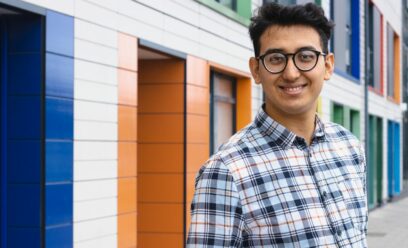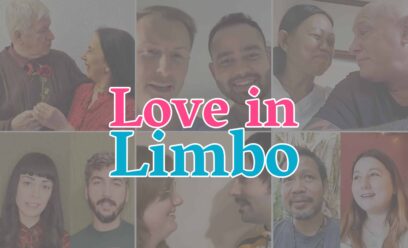Paul Hutchings of Refugee Support Europe: how can we deliver aid with dignity?
Posted by IMIX on October 7, 2022Paul Hutchings, CEO and Co-Founder of Refugee Support Europe, talks about their model of delivering aid that puts dignity first.
Paul Hutchings is the Co-Founder of Refugee Support Europe. They deliver food, hygiene products and essential services to people in Moldova and Cyprus, having also worked in Greece, Bangladesh and Mexico.

Refugee Support Europe. Paul: far left
Paul, what does Refugee Support Europe do?
We offer practical help to people who are fleeing conflict, and we try to give people choice and dignity in the way we do things.
Take, for instance, our Dignity Centres in Cyprus and in Moldova. There we offer material aid: primarily food and some hygiene items. It’s basically a food bank.
I’ve worked at food banks in the UK and very often you get given a general bag of stuff, which doesn’t leave a lot of space to give people choice.
We have tried to create a model that gives people a little bit of control, a bit of freedom. They select a basket of food and hygiene items from a supermarket-like environment, and we give them a set number of points, say 840 points, to spend every week.
So it’s like spending money, but it’s cashless. If they want crisps, or olive oil, they can get those. It’s about giving people that choice and that sense of agency.
We also try to create a beautiful environment to the extent that we can with food banks, where volunteers aren’t on their phone, where everything is super clean and well presented. We make it clear that whoever’s coming through the door is our most valued customer. You would be greeted with a line such as, ‘Hello, welcome. How can I help? Nice to see you. Here are your points, please choose what you like.’

Inside of Dignity Centre at Nicosia, Cyprus
So it’s not just about the aid itself that you deliver?
Exactly, I think of it not just being about the aid, but how you deliver it. The fact that people can take what they like with their points; it’s handing people a bit of power back, a bit of independence and normality, when you are being disempowered outside.
Their lives are often so chaotic, and to the authorities, people there are just numbers.
So how do we take the power from people who are giving aid and place it in the hands of who are receiving it?
And this is what you mean by ‘aid with dignity’?
Yes, we would summarise the approach as thinking about how you do things, not what you give people.
And the more that I do this kind of work, the more I realise that being able to provide food is obviously critical to people’s health, but additionally the food and those services we offer then become a vehicle for something else.
It becomes a vehicle for saying, ‘Here’s a place where you’re going to be treated like a human being. We’re going to greet you with a big smile and say that you can choose whatever you want off the shelves. It’s going to be a little oasis of normalcy and respect.’
You see the transformational effect this kind of approach has on people.
For instance, in Cyprus, we have a lot of people mostly from Central and West Africa who face horrific racism. It can go from insults on the street to being treated very poorly when it comes to getting housing or jobs, so they experience it on a very institutional level as well.
It’s heart-breaking, but it’s important to have spaces that provide a bit of relief from all that.
In Moldova, there are a lot of Ukrainian refugees. They have unimaginable stress because most of the people who’ve left Ukraine are family members who’ve been separated from the men in their families, as they have to stay behind and fight.
In the Dignity Centres, you realise that you don’t just ‘get what you’re given.’ Instead, you have control.
We try to keep the environment of the centres calm and serene, you see how people arrive worried, stressed and anxious, and they leave a bit calmer and more reassured. Because you get a bit of mental relief from the constant worry.

Dignity Centre at Nicosia, Cyprus
How might we apply the concept of dignity as a sector?
So, I would summarise this approach as thinking about how you give, not what you give.
It’s easy to focus on bags of flour, and kilos of tomatoes and how much shampoo you’ve given out. And obviously, that is crucial because these are basic necessities.
But the Dignity Centres really are a vehicle for offering something much more important.
It’s a vehicle to say to people, here’s a bit of normality when life has become completely abnormal. Here’s a safe space where you can rely on someone to be friendly and treat you like a human when you’ve run from a lot of insecurity. Here’s a bit of control, where everything else has kind of fallen apart.
It’s very easy to treat people on the move like numbers and, just generally in a way that can make people feel a bit dehumanised.
It’s about trying to focus on those intangible values. And that comes about from how you deliver aid rather than focus on what you do.
However, it feels like what we do is a drop in the ocean. What we need to recognise is that we need to get together, raise our voices and say, ‘Look, this is just not good enough.’
We are all humans under the sun here. And we all need to do a better job of looking after each other.



